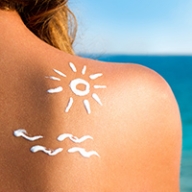Are You At Risk For Skin Cancer?
From an article by
Dr. Ravneet Bajwa
McLeod Oncology & Hematology Associates
Skin cancer can develop anywhere from the scalp to the bottom of the feet, even under a fingernail or inside the mouth. It is both the most common cancer in the United States and the easiest to spot because it begins on the skin, where you can see it.
“The upper or outer layer of the skin (epidermis) has three types of cells,” says McLeod Oncologist Dr. Ravneet Baja. “Thin, flat cells called squamous cells comprise the majority of the epidermis. Basal cells are round and sit under the squamous cells. Melanocytes make melanin, the pigment that gives skin its natural color. When skin is exposed to the sun, melanocytes make more pigment, causing the skin to darken or tan.”
SKIN CANCER & ITS RISK FACTORS
The most common types of skin cancer are squamous cell carcinoma and basal cell carcinoma. These non-melanoma skin cancers can usually be cured.
Risk factors for squamous cell and basal cell carcinoma include:
- Exposure to natural sunlight or artificial sunlight over extended periods of time
- A fair complexion – fair skin that freckles and burns easily; blue or green or other light-colored eyes; red or blond hair
- Previous treatment with radiation
- A weakened immune system
- Actinic Keratosis – rough, scaly patch of skin
- Exposure to arsenic
Melanoma, which forms in the melanocytes, is a less common type of skin cancer that grows and spreads quickly. The risk factors for melanoma include:
- A history of many blistering sunburns, most often as a child or teenager
- Several large or many small moles
- A family history of unusual moles
- A family or personal history of melanoma
- Being Caucasian
COMMON SIGNS OF SKIN CANCER
The most common sign of skin cancer is a change in your skin. Skin cancer can appear on the skin in a number of ways:
- Changing mole or a mole that looks different from others
- Scaly patch
- Non-healing sore or sore that heals and returns
- Dome-shaped growth
- Brown or black streak under a nail
For melanoma specifically, a simple way to remember the warning signs is to learn the “ABCDE” rule:
- Asymmetrical. Does the mole or spot have an irregular shape where one half does not match the other half?
- Border. Is the border irregular or jagged?
- Color. Is the color uneven?
- Diameter. Is the mole or spot larger than the size of a pencil eraser – greater than six millimeters?
- Evolving. Has the mole or spot changed over the past few weeks or months?
PREVENTING SKIN CANCER
While protecting the skin from the sun has not been proven to lower the chance of developing skin cancer, experts suggest using sunscreen that protects against UV radiation; staying out of the sun for long periods of time, especially when the sun is at its strongest and wearing long sleeve shirts and pants, hats or sunglasses when outdoors.
ACTION YOU CAN TAKE
Detected early, skin cancer is highly treatable. If you find a spot on your skin that could be skin cancer, see your primary care physician who can assess the area and determine if you need a skin biopsy.
Have a cancer question? Ask a specialist.
-
McLEOD REGIONAL MEDICAL CENTER FLORENCE
843-777-2000 -
McLEOD DARLINGTON
843-777-1100 -
McLEOD DILLON
843-774-4111 -
McLEOD LORIS
843-716-7000 -
McLEOD SEACOAST
843-390-8100 -
McLEOD CHERAW
843-537-7881 -
McLEOD CLARENDON
803-433-3000



-
McLEOD REGIONAL MEDICAL CENTER FLORENCE
843-777-2000 -
McLEOD DARLINGTON
843-777-1100 -
McLEOD DILLON
843-774-4111 -
McLEOD LORIS
843-716-7000 -
McLEOD SEACOAST
843-390-8100 -
McLEOD CHERAW
843-537-7881 -
McLEOD CLARENDON
803-433-3000
 Find a Doctor
Find a Doctor  Locations
Locations  Services
Services 